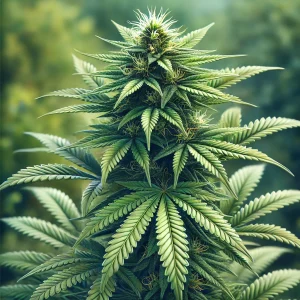
Understanding ADHD and Marijuana: Exploring the Intersection
Understanding ADHD and Marijuana: Exploring the Intersection
ADHD, or Attention-Deficit/Hyperactivity Disorder, is a complex neurodevelopmental condition affecting millions worldwide. Characterized by symptoms such as inattention, hyperactivity, and impulsivity, ADHD significantly impacts daily functioning and quality of life. In the quest for effective treatments and coping strategies, marijuana has emerged as a contentious topic. This blog delves into the relationship between ADHD and marijuana, examining the nuances of self-medication, potential benefits, and risks, based on current scientific evidence.
The ADHD Brain and Addiction: A Closer Look
ADHD is marked by unique dopamine pathways, which play a critical role in reward and motivation. These pathways' differences make individuals with ADHD more prone to seeking substances that can stimulate these circuits, often leading to self-medication. This behavior is particularly evident in scenarios involving repetitive, uninteresting tasks where immediate gratification is preferred over delayed rewards.
Key Points:
- Dopamine Pathway Differences: Imaging studies reveal that dopamine pathways in individuals with ADHD function differently.
- Link to Reward and Motivation: These pathways are closely tied to the brain's reward and motivation systems.
- Self-Medication Tendencies: To regulate these pathways and achieve a feeling of well-being, individuals with ADHD often resort to substances.
- Preference for Immediate Rewards: People with ADHD frequently struggle to delay gratification, opting for immediate rewards instead.
ADHD and Marijuana: The Paradox of Self-Medication
The use of marijuana by individuals with ADHD presents a paradox. While some users report relief from the emotional intensity associated with ADHD, marijuana can exacerbate executive function problems, leading to decreased motivation and increased memory issues. The evidence on this topic is mixed, and the overall scientific consensus is still evolving.
Statistics and Findings:
- Prevalence Among Users: Studies suggest that a significant percentage of marijuana users may have ADHD, with varying rates reported across different studies.
- Gender Differences: Research indicates that inattentive symptoms in women and hyperactive-impulsive symptoms in men are significant predictors of problematic marijuana use.
- Co-occurring Disorders: Adults seeking treatment for cannabis use disorders often show a higher prevalence of ADHD.
Self-Medication: Myth or Reality?
The idea that cannabis can effectively self-medicate ADHD symptoms is widely debated. While some individuals with ADHD use marijuana to alleviate stress and promote relaxation, this self-medication approach often leads to worsened executive function and persistence of ADHD symptoms.
Points of Debate:
- Emotional Relief vs. Symptom Worsening: Marijuana may help with emotional relief but often leads to further executive function issues.
- Mood Improvement vs. ADHD Symptoms: An improved mood does not necessarily equate to a reduction in ADHD symptoms.
Substance Use Disorders and ADHD
ADHD significantly increases the risk of developing substance use disorders (SUDs). Individuals with ADHD are more likely to use substances like nicotine, alcohol, and marijuana, often starting in adolescence. The impulsivity and reward-seeking behavior associated with ADHD contribute to this increased risk.
Comparative Risks:
- Nicotine Use: Individuals with ADHD are more likely to have a history of nicotine use and dependence.
- Alcohol Abuse: They are more likely to meet criteria for alcohol abuse or dependence.
- Marijuana Use Disorder: ADHD increases the likelihood of developing a marijuana use disorder.
- Overall SUD: People with ADHD are at higher risk of developing an SUD.
Common Myths About ADHD and Addiction
Several myths persist regarding the relationship between ADHD, stimulant medication, and addiction. It's essential to debunk these myths to better understand and address the issues at hand.
Myth 1: Stimulant Medications Lead to Addiction
Reality: Research shows no compelling evidence that stimulant treatment in childhood leads to addiction in later life. In fact, stimulants can lower impulsivity, increase judgment, and help individuals with ADHD integrate better socially, ultimately reducing the risk of addiction.
Myth 2: Long-Term Stimulant Use Causes Addiction
Reality: Long-term stimulant use does not lead to addiction. Studies indicate that extended use of stimulant medication may actually decrease the likelihood of developing an SUD.
Myth 3: ADHD Medications Are Abused by ADHD Patients
Reality: While neurotypical brains might become addicted to ADHD medications, individuals with ADHD do not experience the same "high." Extended-release medications are recommended to minimize abuse potential and maintain stable symptom management.
Concurrent Treatment of ADHD and Substance Abuse
Treating ADHD and SUDs concurrently is crucial for effective recovery. Stimulant medications can play a significant role in treating ADHD symptoms without exacerbating addiction issues.
Key Considerations:
- Concurrent Treatment: ADHD should be treated alongside substance abuse to improve overall prognosis.
- Screening and Treatment: Substance abuse treatment centers should screen for and treat ADHD to enhance recovery outcomes.
- Stimulant Medication Benefits: Stimulant medications can significantly reduce cravings and the risk of relapse in individuals with ADHD and co-occurring SUDs.
Additional Insights and Research about Marijuana and ADHD
Recent studies suggest that the endocannabinoid system, which is affected by marijuana, plays a role in ADHD pathology. However, the evidence is still inconclusive, and more research is needed to understand the long-term effects of marijuana use on ADHD symptoms. A scoping review published in the Journal of Psychiatric Research in January 2023 highlighted that while some patients with ADHD report symptom improvement with cannabis use, the overall evidence does not support cannabis as a treatment for ADHD. The review emphasized the lack of high-quality studies and objective measurements, with most studies indicating that cannabis either worsens or has no effect on ADHD symptoms.
Conclusion
The relationship between ADHD and marijuana use is multifaceted and complex. While marijuana might offer temporary emotional relief for some, it often exacerbates executive function problems and does not address core ADHD symptoms. Effective management of ADHD requires a comprehensive approach, including proper medication, behavioral therapies, and addressing co-occurring substance use disorders. By debunking myths and focusing on evidence-based treatments, individuals with ADHD can achieve better outcomes and improved quality of life.
Key Findings from the Scoping Review on Marijuana and ADHD:
- No Significant Effect from RCT: The only randomized controlled trial found no significant effect of cannabis on ADHD symptoms.
- Anecdotal Reports: ADHD patients anecdotally report symptom improvement with cannabis use.
- Low Evidence from Self-Reports: Evidence from self-reports of recreational cannabis users on its impact on attention is extremely low.
- Unknown CBD Effects: The isolated effect of CBD on ADHD symptoms is not well-known.
- Recommendation Against Cannabis: There is not enough evidence to recommend cannabis as a treatment for ADHD.
By enhancing the content with verified facts and additional research, we aim to provide a thorough and accurate examination of the intersection between ADHD and marijuana use, affirming the neurodivergent experience and focusing on the unique strengths and challenges of individuals with ADHD.
Sources
- Francisco, A.P., Lethbridge, G., Patterson, B., Bergmann, C.G., Van Ameringen, M. "Cannabis use in Attention-Deficit/Hyperactivity Disorder (ADHD): A scoping review," Journal of Psychiatric Research, Volume 157, January 2023, Pages 239-256. DOI: 10.1016/j.jpsychires.2022.11.029





